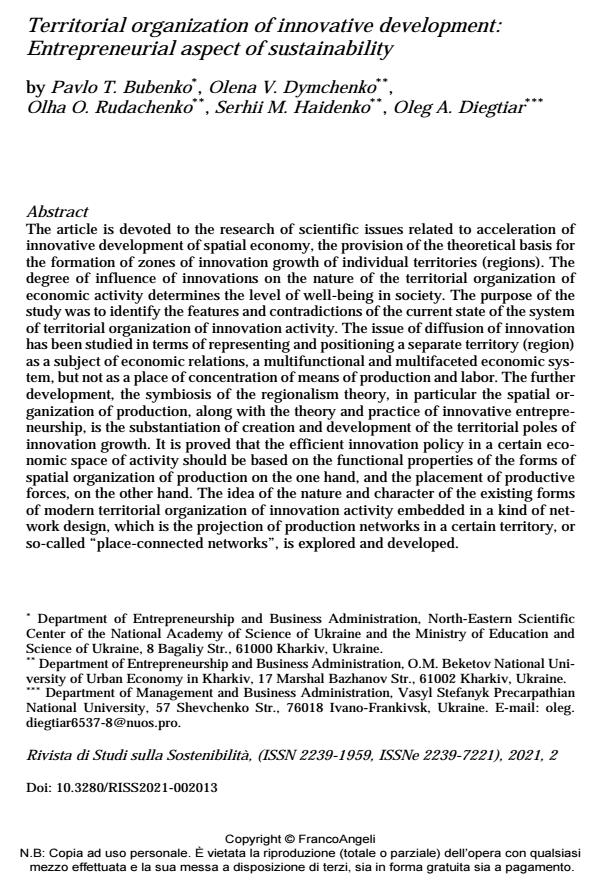Territorial organization of innovative development: Entrepreneurial aspect of sustainability
Titolo Rivista RIVISTA DI STUDI SULLA SOSTENIBILITA'
Autori/Curatori Pavlo T. Bubenko, Olena V. Dymchenko, Olha O. Rudachenko, Serhii M. Haidenko, Oleg A. Diegtiar
Anno di pubblicazione 2022 Fascicolo 2021/2
Lingua Inglese Numero pagine 15 P. 171-185 Dimensione file 126 KB
DOI 10.3280/RISS2021-002013
Il DOI è il codice a barre della proprietà intellettuale: per saperne di più
clicca qui
Qui sotto puoi vedere in anteprima la prima pagina di questo articolo.
Se questo articolo ti interessa, lo puoi acquistare (e scaricare in formato pdf) seguendo le facili indicazioni per acquistare il download credit. Acquista Download Credits per scaricare questo Articolo in formato PDF

FrancoAngeli è membro della Publishers International Linking Association, Inc (PILA)associazione indipendente e non profit per facilitare (attraverso i servizi tecnologici implementati da CrossRef.org) l’accesso degli studiosi ai contenuti digitali nelle pubblicazioni professionali e scientifiche
The article is devoted to the research of scientific issues related to acceleration of innovative development of spatial economy, the provision of the theoretical basis for the formation of zones of innovation growth of individual territories (regions). The degree of influence of innovations on the nature of the territorial organization of economic activity determines the level of well-being in society. The purpose of the study was to identify the features and contradictions of the current state of the system of territorial organization of innovation activity. The issue of diffusion of innovation has been studied in terms of representing and positioning a separate territory (region) as a subject of economic relations, a multifunctional and multi-faceted economic system, but not as a place of concentration of means of pro-duction and labor. The further development, the symbiosis of the regionalism the-ory, in particular the spatial organization of production, along with the theory and practice of innovative entrepreneurship, is the substantiation of creation and de-velopment of the territorial poles of innovation growth. It is proved that the effi-cient innovation policy in a certain economic space of activity should be based on the functional properties of the forms of spatial organization of production on the one hand, and the placement of productive forces, on the other hand. The idea of the nature and character of the existing forms of modern territorial organization of innovation activity embedded in a kind of network design, which is the projection of production networks in a certain territory, or so-called "place-connected net-works", is explored and developed.
Parole chiave:region, poles, growth, cluster, competition.
- Metaverse, the last technological frontier of environmental sustainable food: Worldwide evidence from the first business case studies Flavio Boccia, Joanna Rosak-Szyrocka, Houman Hashemzadeh, Daniela Covino, in RIVISTA DI STUDI SULLA SOSTENIBILITA' 1/2023 pp.153
DOI: 10.3280/RISS2023-001009 - Обґрунтування напрямів розвитку інноваційного підприємництва Н. В. Валінкевич, М. О. Рибак, in Проблеми сучасних трансформацій. Серія: економіка та управління /2024
DOI: 10.54929/2786-5738-2024-11-03-12 - ІННОВАЦІЙНЕ УПРАВЛІННЯ ТРУДОВИМ ПОТЕНЦІАЛОМ У СИСТЕМІ ДИДЖИТАЛІЗАЦІЇ ФІНАНСОВО-ЕКОНОМІЧНОЇ БЕЗПЕКИ СМАРТЕКОНОМІКИ Людмила Пронько, Поліна Пузирьова, Віталій Собчишин, Лариса Варава, Денис Захаров, Олена Виноградова, in Financial and credit activity problems of theory and practice /2025 pp.554
DOI: 10.55643/fcaptp.1.60.2025.4694
Pavlo T. Bubenko, Olena V. Dymchenko, Olha O. Rudachenko, Serhii M. Haidenko, Oleg A. Diegtiar, Territorial organization of innovative development: Entrepreneurial aspect of sustainability in "RIVISTA DI STUDI SULLA SOSTENIBILITA'" 2/2021, pp 171-185, DOI: 10.3280/RISS2021-002013